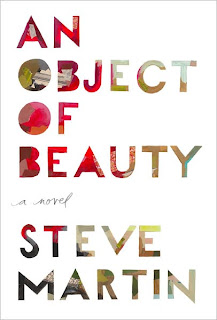 Novels can be about many things -- a time, a place, a moment, an idea. They're usually, though, at least secondarily about their characters -- who may be chess-pieces designed to illustrate that idea or walk through that time, but must have some sort of arc to their lives. And, even more importantly, the novelist has to remember which character is at the center of his novel, and make sure that the story of that character is told.
Novels can be about many things -- a time, a place, a moment, an idea. They're usually, though, at least secondarily about their characters -- who may be chess-pieces designed to illustrate that idea or walk through that time, but must have some sort of arc to their lives. And, even more importantly, the novelist has to remember which character is at the center of his novel, and make sure that the story of that character is told.Steve Martin is no newcomer to the novel: Shopgirl was a little gem, and The Pleasure of My Company was even better, a close study of a realistically quirky, odd character. But his third novel, An Object of Beauty
Object of Beauty takes place mostly in the '90s, in the go-go years before the first millennial crash, 9/11, the bubble economy of the war years, and the second, definitive millennial crash. (All those elements come into the last third of the novel, but they do so as if imposing, as if Martin's story wanted to take place in a world without them, but he couldn't quite make it happen.) The story is told by Daniel Franks, who spends a long time working very slowly to become a writer about the art world, but he never quite becomes a character and never quite becomes transparent, either. Instead, he's a lightly tinted window through which we see the real subject of the novel: Lacey Yaeger, the latest woman on the make in a novel, in a long string stretching back at least as far as Becky Sharp.
Like Daniel, Lacey is a failed artist -- they met in school, and, apparently, both decided independently that the art world was for them, but not the actual hands-on making of art. Lacey got a job at Sotheby's, and Martin is good at portraying the scrambling for the tiniest of positions in such an in-demand field, how presentation and connections and self-possession and raw desire all have to come together just right to get even the slightest toehold on the ladder of success in the genteel knife-fight of the art world. Lacey does have the tools to survive in that world -- she's gorgeous, knows it, and is equally smart and savvy and willing to work hard.
But Martin's novel covers a huge span of time -- Daniel and Lacey hit New York in 1993, and the novel runs through the aftermath of the 2007 crash -- without either of them changing substantially at all, either individually or in their relationships with each other. During the long middle of the novel, corresponding to the long middle of the '90s, as the art market heated up and money was tossed around on all sides, the reader is left wondering how long any of this is taking, and what else Daniel and Lacey are doing with the rest of their time. There's very little sense of the texture of their lives changing, and only isolated mentions of changes in those lives -- Lacey's original cluster of downtown friends move away, marry, and settle down, without any of them getting a single line of dialogue in the novel -- as Martin focuses entirely on how Daniel looks at Lacey.
As a view of the go-go years of the art world from a writer who knew it pretty well, An Object of Beauty is interesting; the reader inevitably wonders how many of the little details Martin weaves in are true, or only slightly changed from true. But Lacey stays opaque to Daniel, and thus to us -- and Martin makes an unforgivable mistake at the very end of Object, thinking that this is Daniel's story. It isn't, not at all, and so the last line is about what might possibly be happening between two minor characters, while we don't know how this all really affected Lacey. (Perhaps it changed her utterly, or perhaps not at all, but we need to know.)
As interesting failures go, Object is compelling, casually authoritative, and deeply entertaining. But its central spine is out of joint, and so this object can never stretch itself into a figure of beauty itself. Somewhere deep inside itself, Object wanted to be a novel about a shorter period of time, about those go-go '90s, and more tightly focused on Daniel and Lacey -- that could have been a great novel. This one, though, is pleasant but ultimately forgettable.
Book-A-Day 2010: The Epic Index
No comments:
Post a Comment